The financial crisis, whistle-blowers
& increased surveillance
2010s
“Nobody from Wall Street goes to prison. Nobody. No one”
- Gary Aguirre
Overview
1
2
WHISTLE-BLOWERS, EDWARD SNOWDEN & THE 2012 NATIONAL DEFENSE AUTHORISATION ACT
In 2013, former National Security Agency contractor Edward Snowden leaks documents revealing an increased domestic surveillance programme. Like other whistle-blowers before him, Snowden is charged under the Espionage Act.
Journalist Chris Hedges challenges the legality of the 2012 National Defense Authorisation Act that would have enabled the indefinite military detention of US citizens without trial.
1
OBAMA, WALL STREET & THE ELITE ONE PERCENT
Barack Obama’s presidency begins with the fallout from the 2008 credit crisis. A $700bn bailout plan saves the banks from collapse.
The US struggles in the wake of a financial crisis that exposes the deep ties between government and systemic corporate greed.
The Obama administration fails to prosecute any leading figure for the crisis and offers little or no support for thousands of Americans who lose their homes.
Obama, Wall Street & the elite one percent
President-elect Barack Obama, Vice President Joe Biden and their families wave to the crowd after their election victory party in Chicago's Grant Park (Photo by Ralf-Finn Hestoft/Corbis via Getty Images)
“The problem is not left or right. The problem is that whoever is in the White House has very little room to move.”
- Naomi Wolf
US Presidential election 2008
Source: US National Archives and Records Administration

“Because of what we did on this day, in this election, at this defining moment, change has come to America.”
- Barack Obama
Barack Obama's speech
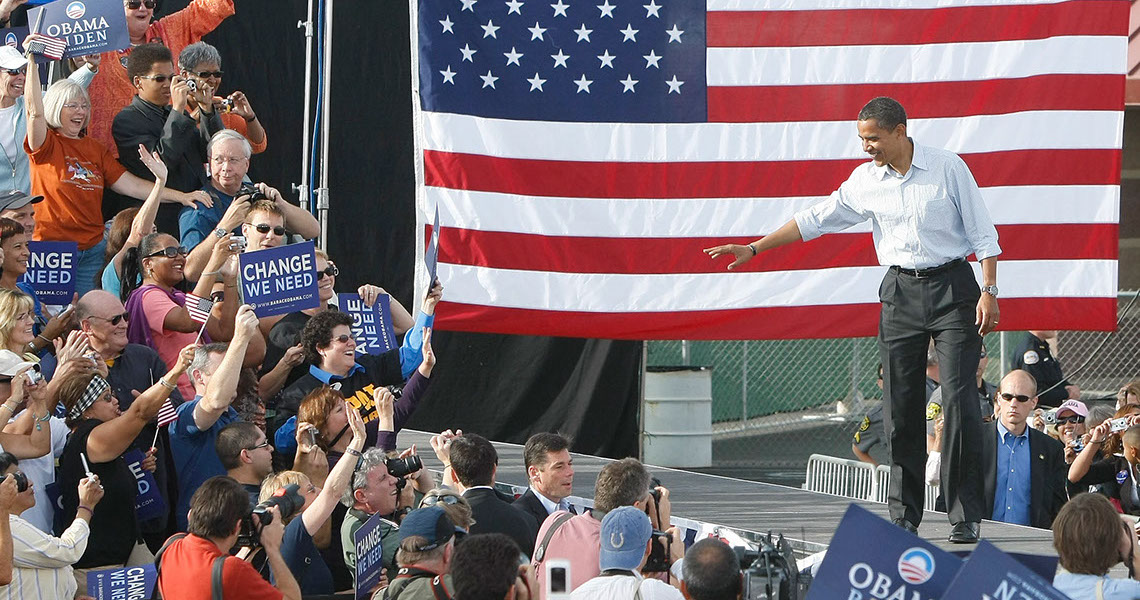
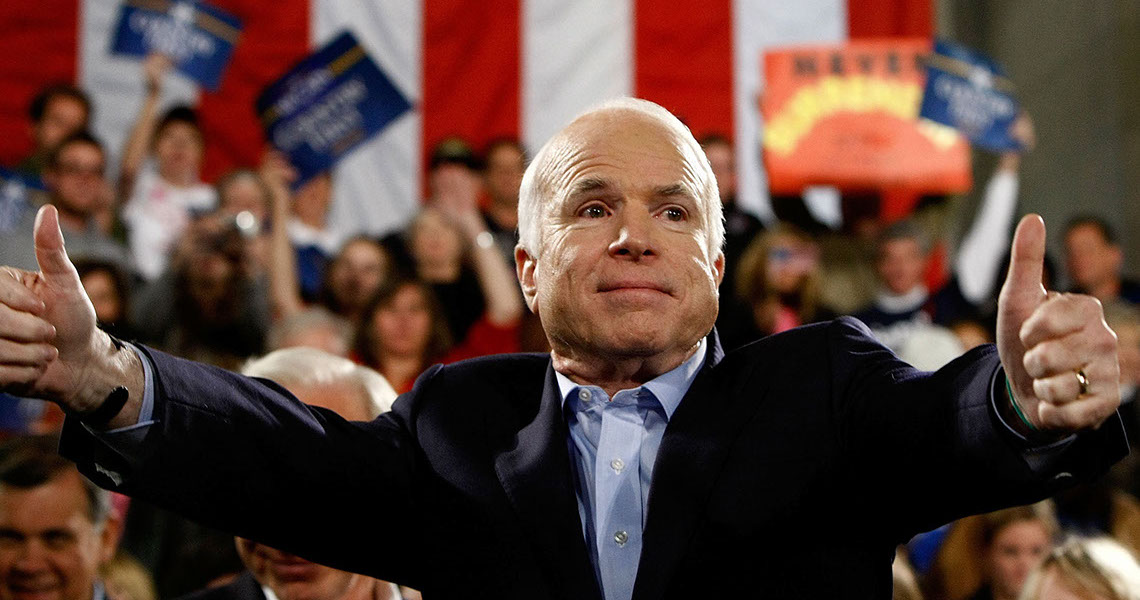
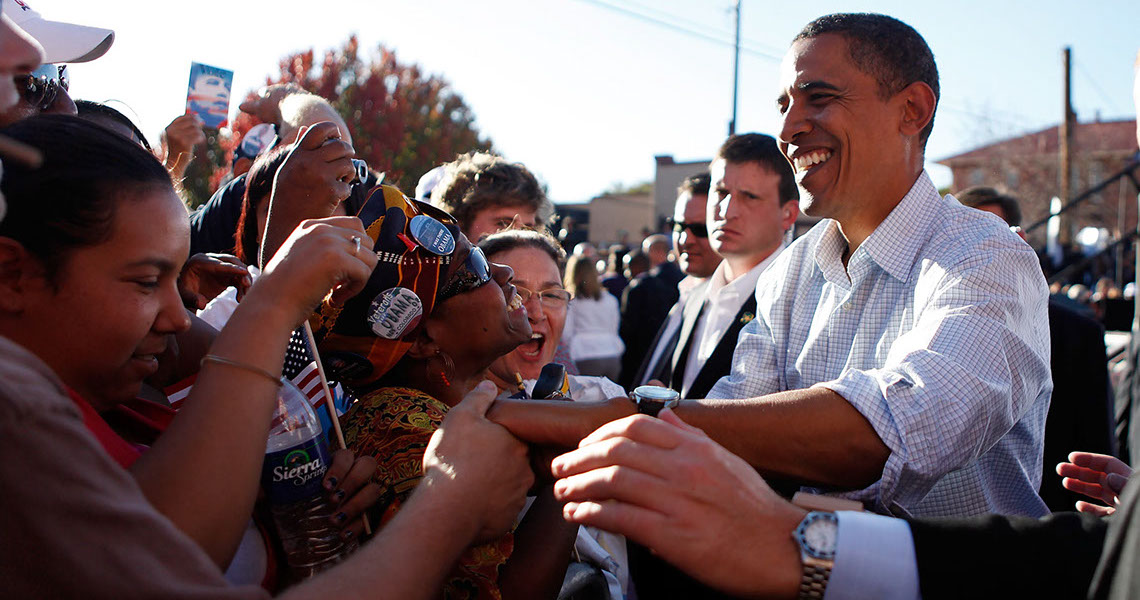
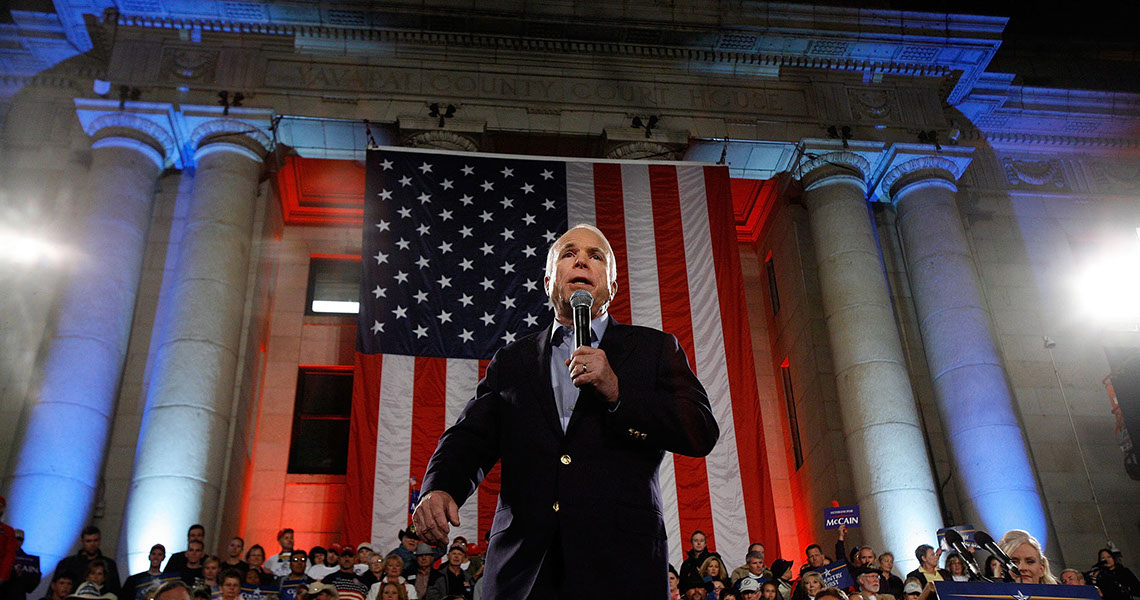
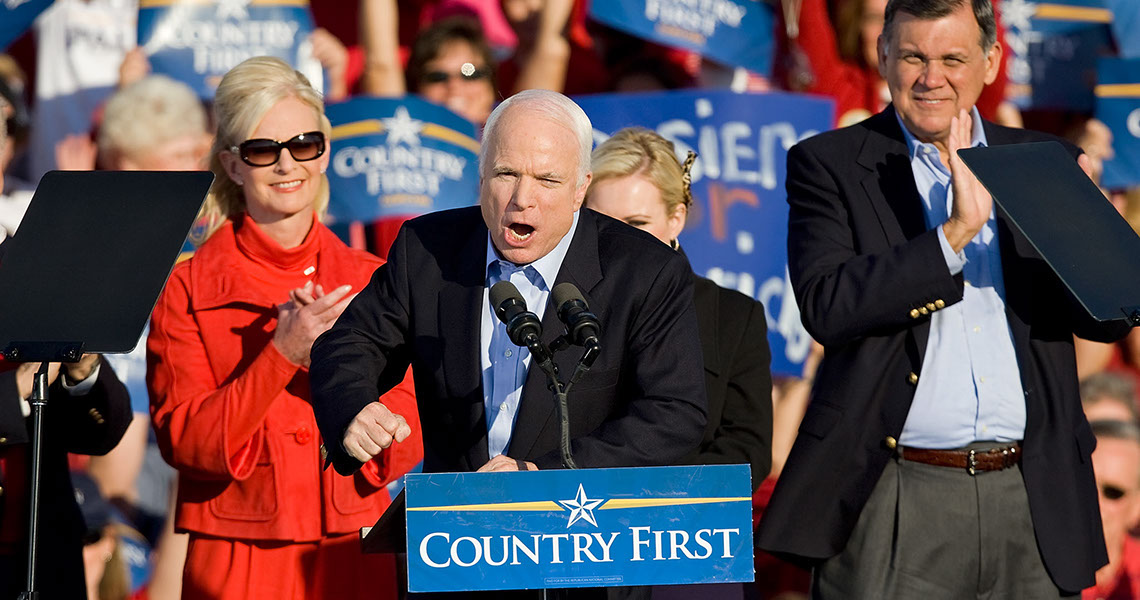
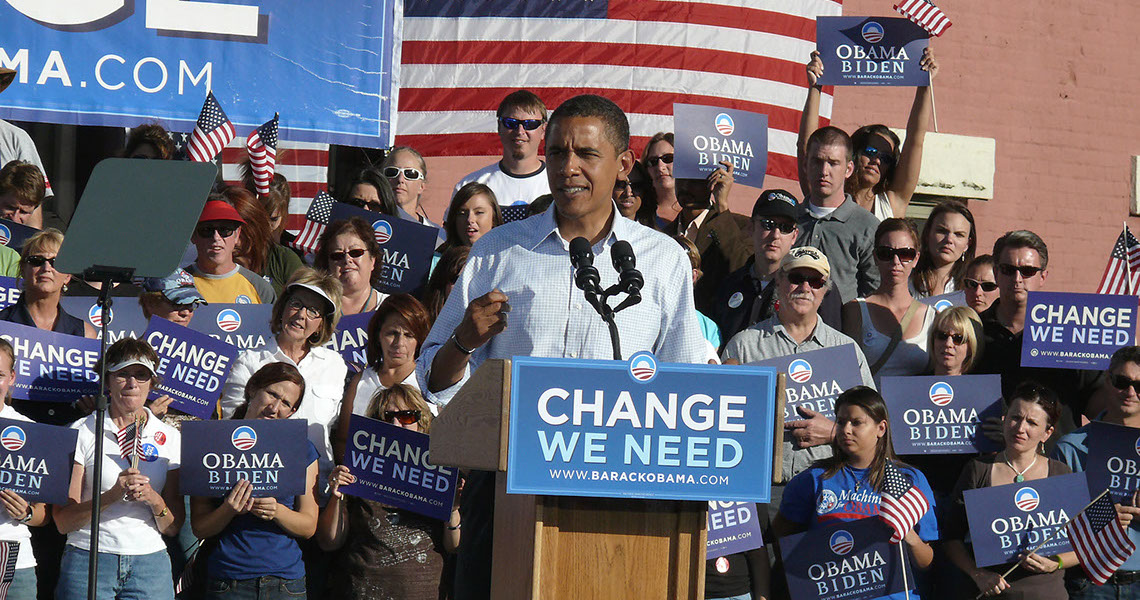
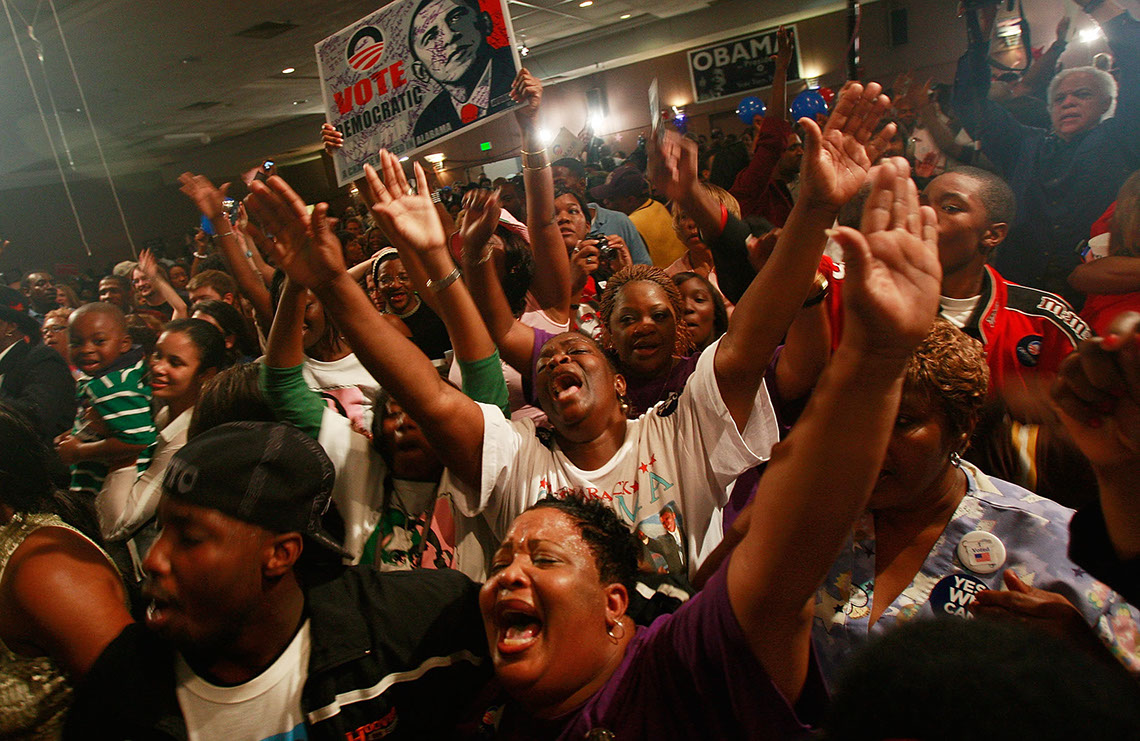
Democratic presidential nominee U.S. Sen. Barack Obama (D-IL) greets supporters as he arrives at a campaign rally at Coronado High School November 1, 2008 in Henderson, Nevada. (Photo by Ethan Miller/Getty Images)
Republican presidential nominee Sen. John McCain (R-AZ) addresses a campaign rally in front of the Yavapai County Courthouse November 4, 2008 in Prescott, Arizona. (Photo by Chip Somodevilla/Getty Images)
Democratic presidential nominee U.S. Sen. Barack Obama (D-IL) shakes hands with people during a campaign rally November 1, 2008 in Pueblo, Colorado. (Photo by Joe Raedle/Getty Images)
Republican presidential nominee Sen. John McCain (R-AZ) addresses a campaign rally at the Henderson Pavilion November 3, 2008 in Henderson, Nevada. (Photo by Chip Somodevilla/Getty Images)
Republican presidential candidate John McCain speaks at a campaign rally at the airport on November 3, 3008 in Indianapolis, Indiana. (Photo by Joey Foley/FilmMagic)
Democratic Presidential Campaign -- Pictured: Senator and Presidential nominee Barack Obama speaks at a rally in Pueblo, CO on November 1, 2008 (Photo by Mark Hudspeth/NBC/NBCU Photo Bank via Getty Images)
U.S. Sen. Barack Obama (D-IL) supporters celebrate as his win of the presidential election is announced November 4, 2008 in Birmingham, Alabama. (Photo by Mario Tama/Getty Images)
1 - 7
<
>
MICHAEL KAZIN
ELAINE BROWN
“Obama was exciting because he was eloquent, he was African American. He was an intellectual and professor, and that was important, too. He seemed like the harbinger of something really new.”
Watch
“It didn't occur to anyone that one of the reasons that Obama could even get this far was that he had to be totally, totally immersed in and protected by a very big, cartel of rich people who thought, here's what we can do.”
Watch
CHRIS HEDGES
NAOMI WOLF
“Obama spent two years, only two years, in the Senate. His voting record, which is the only thing that should have counted, was one corporate giveaway after another.”
“Obama got in, and he's the pawn of globalised interests. The problem is not left or right. The problem is that whoever’s in the White House has very little room to move.”
Watch
Watch
Barack Obama's
Barack Obama’s presidency would begin with the fallout from the 2008 credit crash.
Crash course: What was the financial crisis of 2008?
•
•
•
•
•
The Global Financial Crisis of 2007-2008 is considered by many economists to have been the worst financial disaster since the Great Depression (1929-1939).
In 2007, a depreciation in the subprime mortgage market in the US led to an international crisis and the collapse of the investment bank, Lehman Brothers, in 2008.
The collapse was exacerbated by excessive risk-taking by big banks, such as Lehman Brothers, and this magnified the global impact.
To prevent a collapse of the world’s financial system, government bailouts and other fiscal policies were instituted to prevent further collapse.
Despite efforts, a massive economic downturn, referred to as the Great Recession, followed. Housing prices fell by almost 32 percent, and by 2009 - two years after the crisis began - unemployment was still above nine percent.

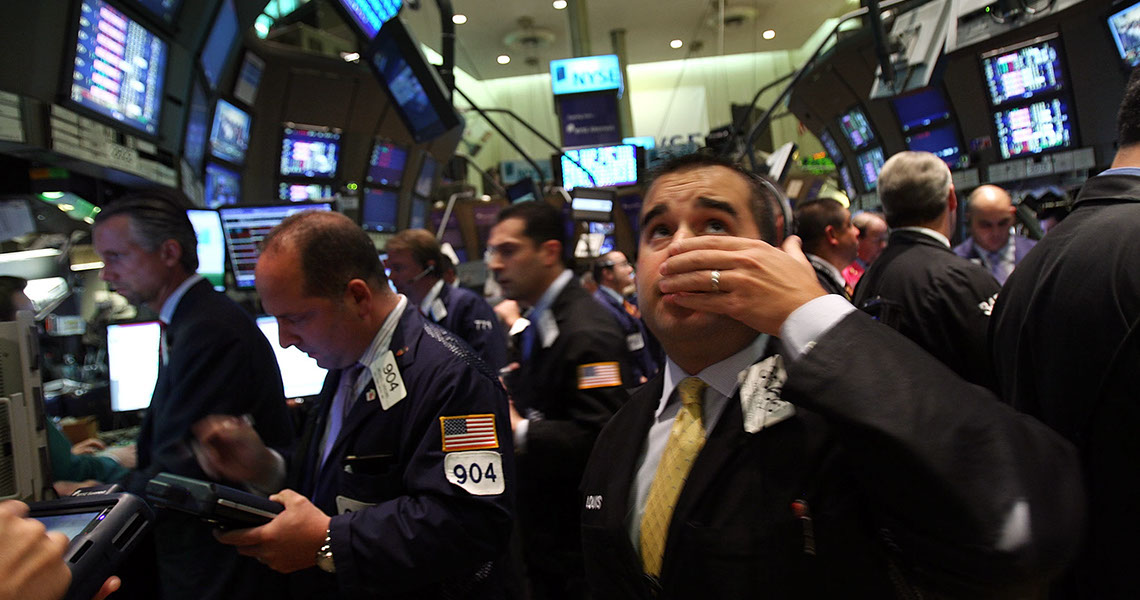
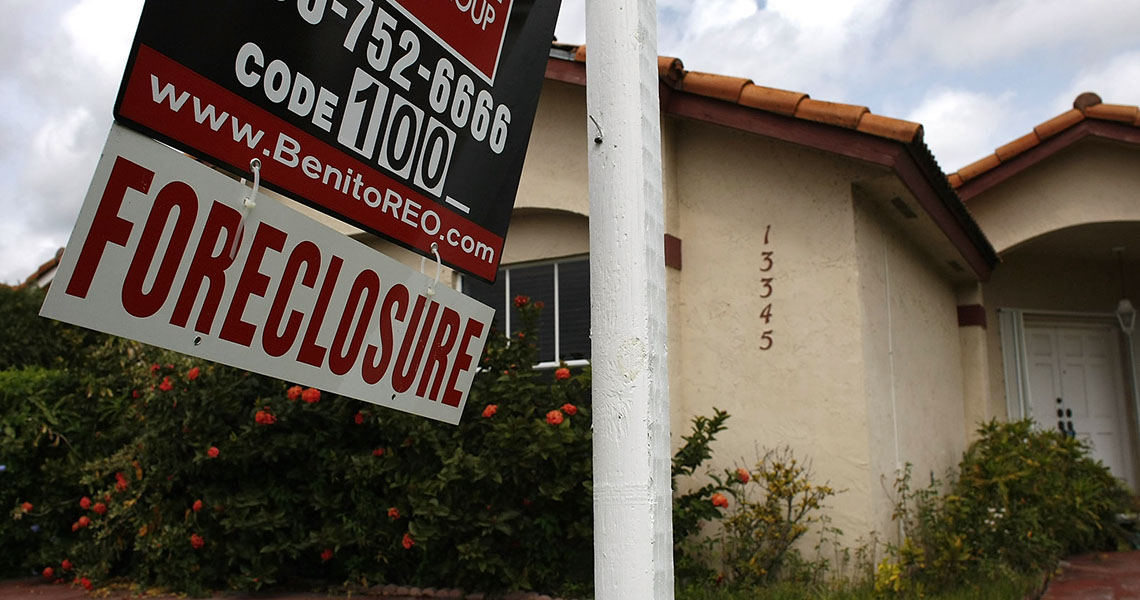
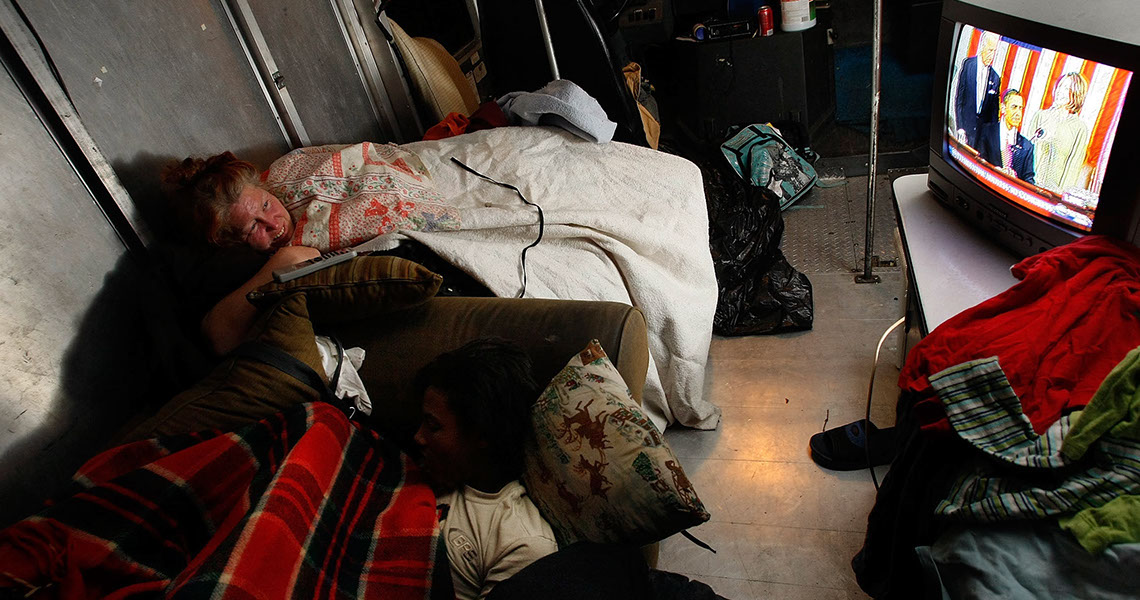
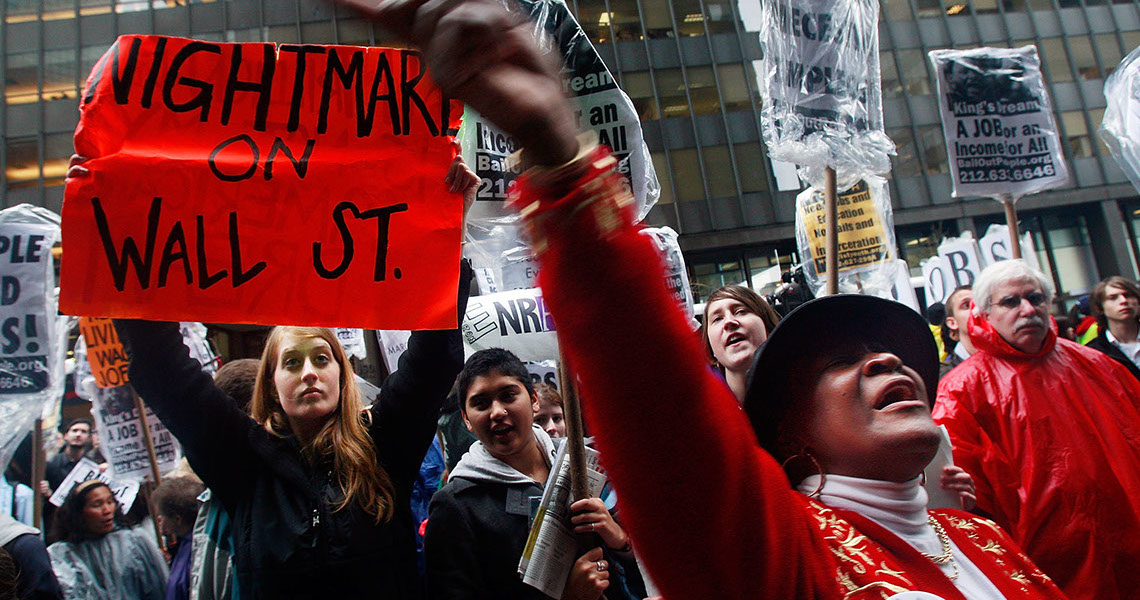
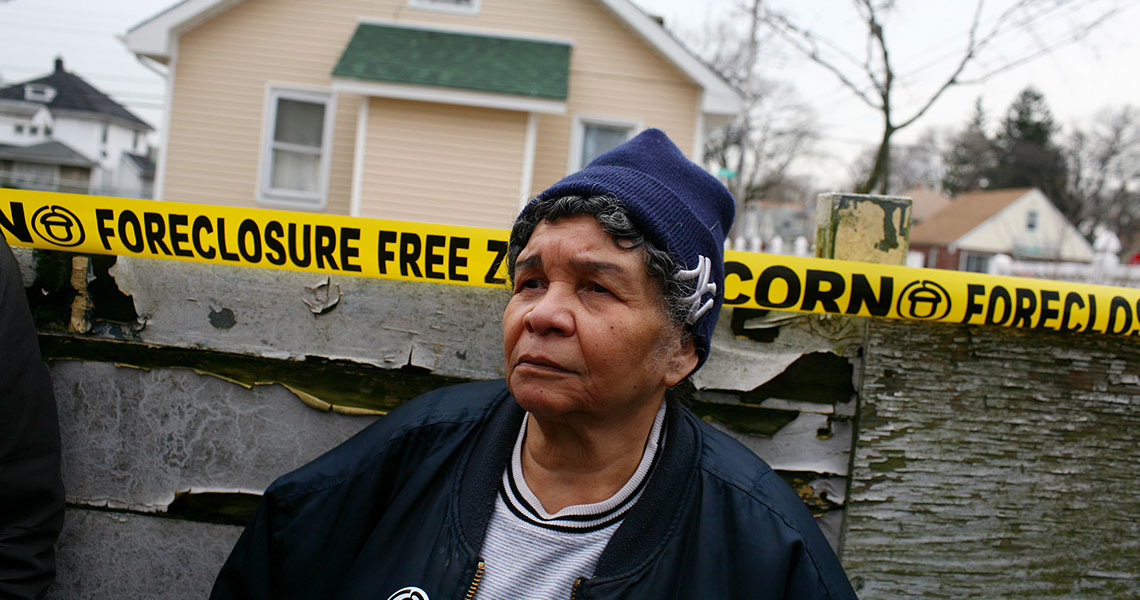
Mason Fitzgerald embraces his daughter Brandie Barbiere after her household possessions were removed to the front yard during a home foreclosure on October 5, 2011 in Milliken, Colorado. (Photo by John Moore/Getty Images)
A trader works on the floor of the New York Stock Exchange September 15, 2008 in New York City. (Photo by Spencer Platt/Getty Images)
A foreclosure sign hangs in front of a home March 4, 2008 in Miami, Florida. (Photo by Joe Raedle/Getty Images)
Mary Trody watches U.S President Barack Obama during his speech before Congress on a television as he son Sylvester Thomas sleeps in the van her and her family are living in as it is parked in front of their foreclosed home. (Photo by Joe Raedle/Getty Images)
People demonstrate in the financial district April 3, 2009 in New York City. (Photo by Mario Tama/Getty Images)
Myrna Millington, 74, a resident and home owner in Queens, stands with Acorn housing activists and local politicans in front of her foreclosed home. (Photo by Andrew Lichtenstein/Corbis via Getty Images)
1 - 6
<
>
A crisis that had begun with an unfettered banking sector issuing loans to people ill-equipped to make repayments, and then trading those toxic debts, took America's financial foundations to the brink.
President Obama faced a choice – save the banks that caused the problem, or support the American people suffering the consequences.
CHRIS HEDGES
“Ron Suskind writes a book about the crisis and he recounts a meeting, right after Obama takes office in 2009, with all of the leading bankers. And Obama tells them, “I'm all that stands between you and the pitchforks,” and he makes it very clear that he is not going to go after Wall Street and he doesn't. He brings in his brain trust, which includes Lawrence Summers, Clinton's former Treasury Secretary, who along with Robert Rubin and a few others orchestrated this meltdown.”
Watch
In 1999, Robert Rubin and Lawrence Summers, successive Secretaries of the Treasury in the Clinton administration, and both with long-standing connections to Wall Street banks, led the repeal of the Glass-Steagall Act.
The act had, in the wake of the 1929 Wall Street Crash, forced banks to keep their investment and commercial activities separate - stopping them betting with the deposits of ordinary citizens.
The 1993 Glass-Steagall Act
•
•
•
•
•
The Glass-Steagall Act, also known as the Banking Act of 1933, is a law that prevented banks from using depositors' funds for high-risk investments, such as the stock market.
It was enacted by the federal government as an emergency response to the failure of nearly 5,000 banks during the Great Depression.
The legislation was replaced in 1999 by the Gramm-Leach-Bliley Act, after investment bankers successfully lobbied against what they perceived to be the over-regulation of the industry.
The ability to gamble on high-risk investments meant banks soon became too big to fail.
During the 2007-2008 financial crisis, a $700bn government bailout was needed to avoid another depression.
When it came to fixing the problems of the 2008 crash, brought about by banks gambling with the mortgages of millions of Americans, President Obama turned to the very men who had helped make that gamble possible.
Barack Obama made sure the $700bn bailout plan, enacted by his predecessor George W. Bush, was pushed through to save the banks threatened by a collapse of their own making.
Washington was in thrall to Wall Street.
Even the Securities and Exchange Commission (SEC) was skewed in ‘big money’s’ favour.
CHRIS HEDGES
“It goes back to destroying Glass-Steagall, so it destroys, you know financial regulations. That financialisation of the economy was pushed forward by people like Summers.”
Watch
What is the Securities & Exchange Commission (SEC)?
•
•
The Securities and Exchange Commission (SEC) is a federal agency responsible for regulating the securities industry and for enforcing federal securities law.
It is tasked with protecting the public against fraudulent and manipulative activities in financial and securities markets.
Proposed in 1929 by lawyer Ferdinand Pecora, the SEC was to implement controls to safeguard the people from the excesses and corruptions of the finance industry.
In 2009, President Obama tasked the SEC with investigating how the banks had run amok with such devastating effect.
His appointments would lay bare the compromise and conflict running through US governance.
President Obama appointed Mary Schapiro as Chairman of the SEC. Schapiro was a long-time member of the financial regulation establishment and had fostered close ties with the finance industry. She in turn hires Robert Khuzami.
Robert Khuzami, former federal prosecutor, is the new head of enforcement at the Securities and Exchange Commission (Photo by Kevin Clark/The Washington Post/Getty Images)
Robert Khuzami had been general counsel for Deutsche Bank in the US, helping the German giant unleash the toxic financial instruments that helped create the 2008 crisis.
By the following year, Khuzami was leading an investigation into the crisis at the Securities and Exchange Commission.
GARY AGUIRRE
“What Pecora said is, if we ever loosen those controls, if we loosen them and let it back out of its cage, it'll do the same thing all over again because it is in its DNA. It's in the bank's DNA to run amok, if you let them run amok.”
Watch
GARY AGUIRRE
“He brings in Mary Schapiro, who is at the heart of Wall Street. Her credentials for being among Wall Street elite are unimpeachable. She's 100 percent pure blueblood Wall Street. And then she hires Khuzami to head enforcement.”
Watch
“Today’s action is about holding individuals accountable …”
- Robert Khuzami
Robert Khuzami
GARY AGUIRRE
GARY AGUIRRE
“If you wanted to pick someone who would have to go soft on Wall Street, you couldn't do any better than Robert Khuzami, because if he put together a list of the top 10 people for him to pursue, he would have to be on that list.”
Watch
“We still have another office to fill, and that office is the cop, the actual cop of Wall Street. The US Attorney for the Southern District of New York. So, Preet Bharara is selected for that role. Now, Preet Bharara is the former right-hand man for Senator Schumer, the tax man for the senate finance committee to fund senate races, that's him. So, he's owned by Wall Street. So, any progress against Wall Street is dead on arrival. According to the senate investigations committee, the financial fraud crimes of the crisis cost the US $21 trillion. Nobody from Wall Street goes to prison. Nobody. No one.”
Watch
With Khuzami in place, the team to tackle the corruptions of high finance would have one more appointment before it was complete. That role, the US Attorney for the Southern District of New York, would be filled by another recognised figure in financial and political circles, Preet Bharara.
When it came to checking and punishing the wrongs of corporate power, far from bringing change to America, President Obama maintained business as usual.
The good of the few still came before the good of the many.
The US was struggling in the wake of a financial crisis that exposed the deep ties between government and systemic corporate greed, leaving the American people to suffer the costs.
MICHAEL McQUARRIE
MICHAEL McQUARRIE
“The economic situation creates a huge amount of insecurity, a very large sense that America is no longer working for the American people as a whole.”
Watch
“We saw how it was rigged with the crash in that the people who caused the problem got bailed out to the tune of billions and billions and billions, where the ordinary homeowner, no help for them whatsoever. And that fuelled so much anger. It fuelled anger on the right and the left."
Watch
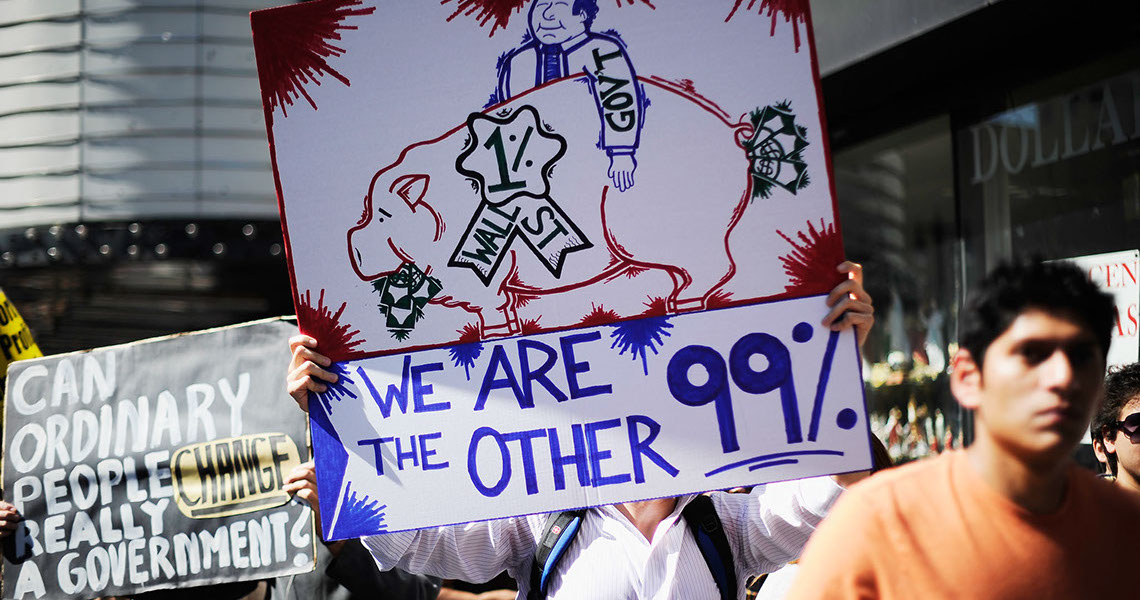
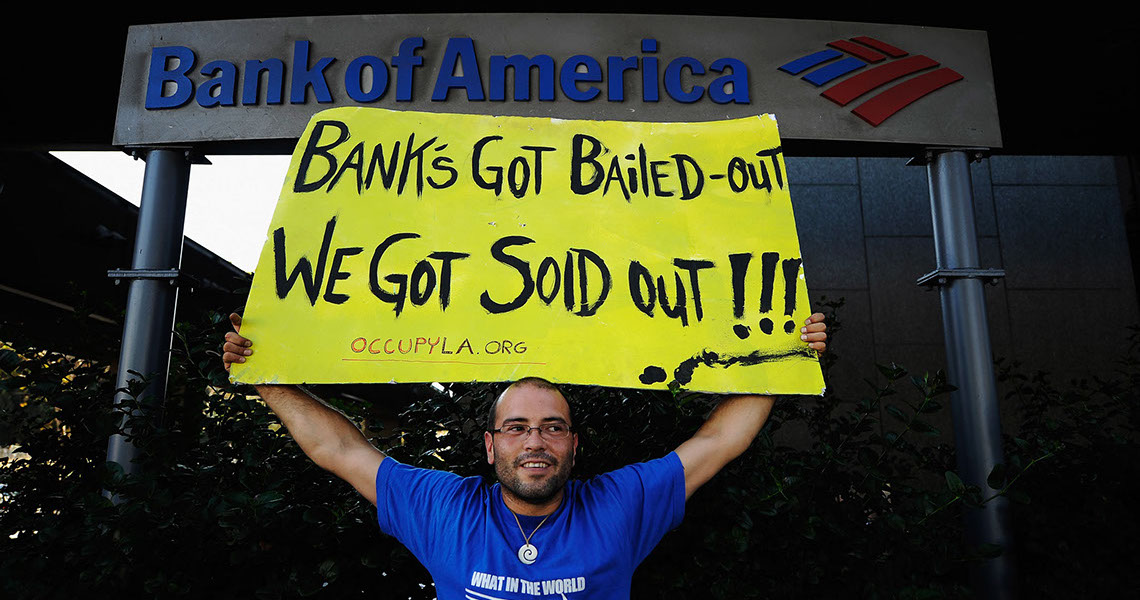
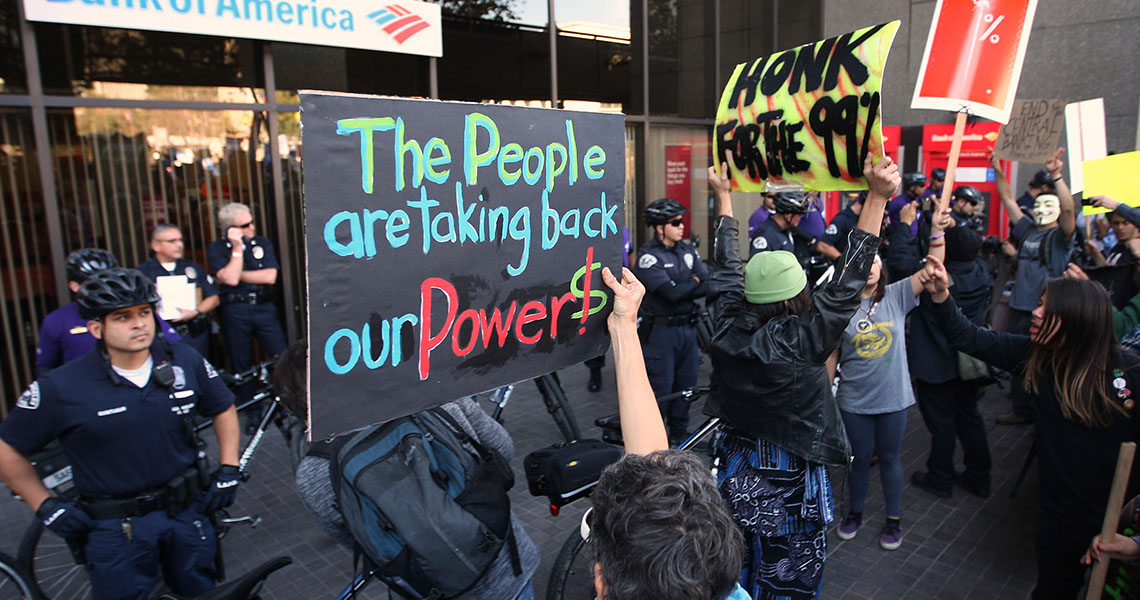
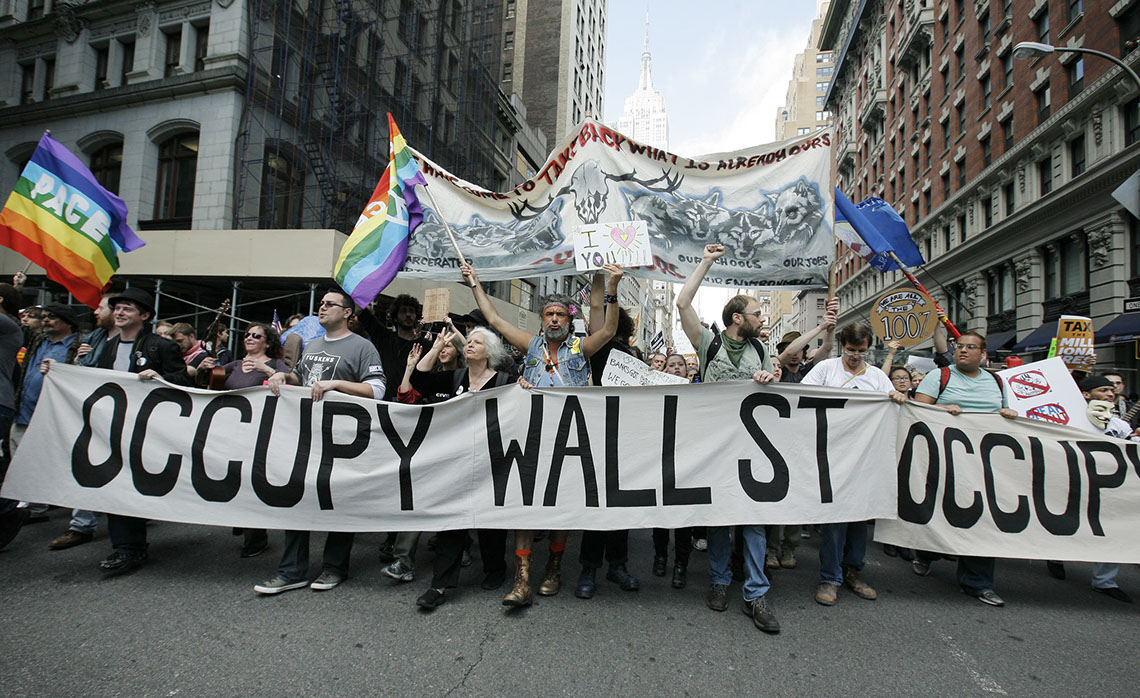
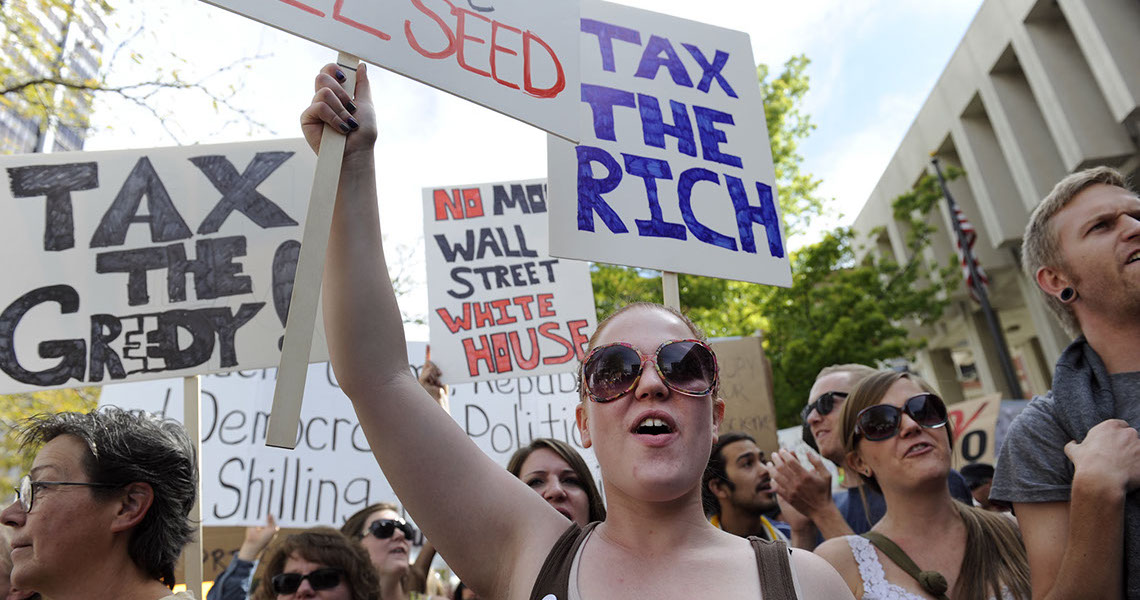
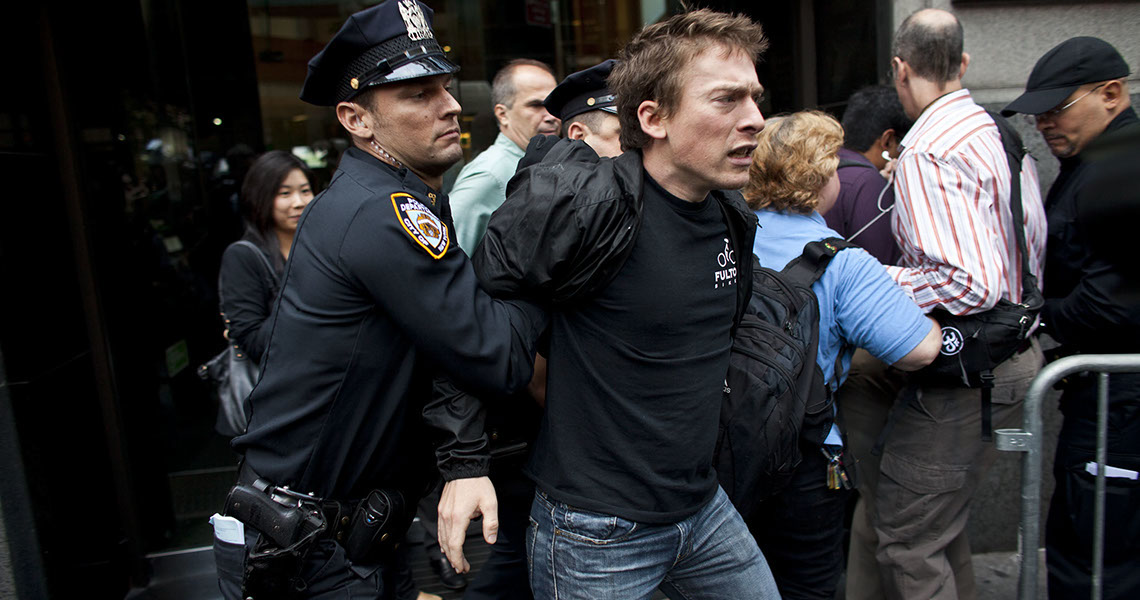
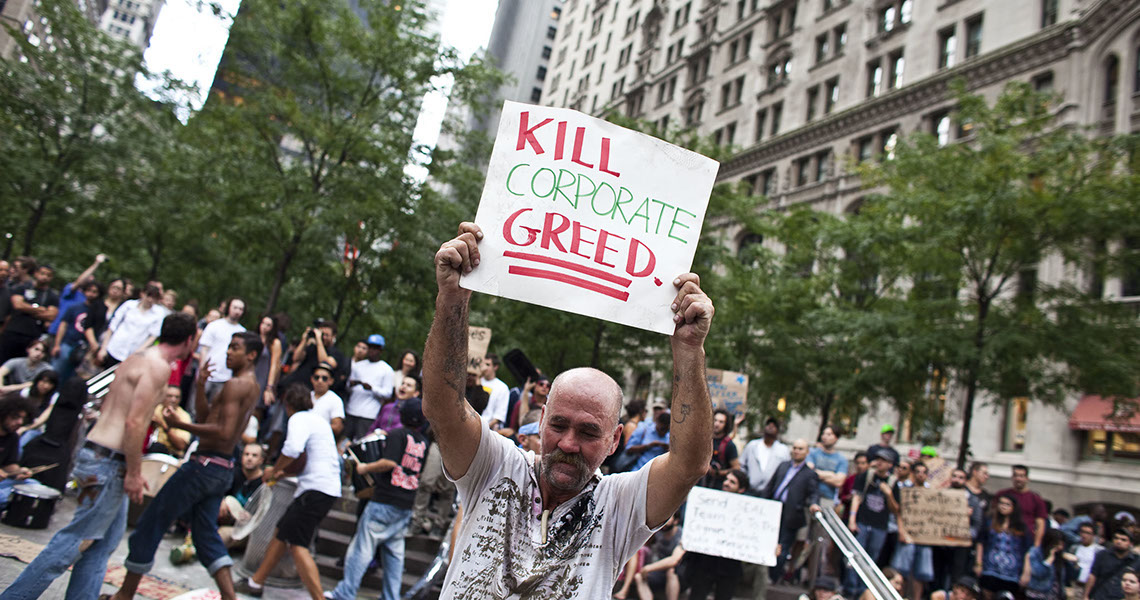
Protesters hold signs as they march to Los Angeles City Hall during the 'Occupy Los Angeles' demonstration in solidarity with the ongoing 'Occupy Wall Street' protest in New York City on October 1, 2011 in Los Angeles, California. (Photo by Kevork Djansezian/Getty Images)
A protester holds a sign after a march to LLos Angeles City Hall during the 'Occupy Los Angeles' demonstration. (Photo by Kevork Djansezian/Getty Images)
Police officers stand guard as Occupy LA protesters stop to demonstrate at a Bank of America during the Move Your Money March. (Photo by David McNew/Getty Images)
Occupy Wall Street protestors march down Fifth Avenue towards Union Square during a May Day rally on May 1, 2012 in New York City. (Photo by Monika Graff/Getty Images)
Protesters pause in front of the Denver branch of the Federal Reserve Bank and chant, 'We are the 99 percent.' (Photo By Kathryn Scott Osler/The Denver Post via Getty Images)
A protestor resists being arrested during a demonstration in Lower Manhattan on the first anniversary of the Occupy Wall Street Movement in New York City, on Monday September 17, 2012. (Photo by Ramin Talaie/Corbis via Getty Images)
Billy Blackhawk a protestor from Tennessee holds up a sign at Zuccotti Park where hundreds of demonstrators have camped out in Lower Manhattan for 14 days on Friday, September 30, 2011. (Photo by Ramin Talaie/Corbis via Getty Images)
1 - 7
<
>
On the left, the Occupy movement looked to challenge Wall Street’s might and America’s income inequality, turning the fact of wealth concentration in an elite one percent of the population into a mobilising battle cry.
For the right, the backlash against government policies would find form in a new entity cut from familiar cloth.
Former Alaska governor Sarah Palin waves to the crowd before speaking during the Tea Party of America's 'Restoring America' event at the Indianola Balloon Festival Grounds on September 3, 2011 in Indianola, Iowa. (Photo by Justin Sullivan/Getty Images)
Sarah Palin
JONATHAN WEILER
JULIET SCHOR
CHRIS HEDGES
“The Tea Party really was a right-wing formation that opposed the idea that the government should step in and spend this kind of money to bail out people who didn't deserve to be bailed out. There are other elements of the Tea Party that were clearly steeped in, what I would describe as, racial resentment.”
Watch
“It's older white people who feel that they're the ones getting shafted. These people sort of see themselves as standing in line waiting, and suffering a lot from the recession. But then, some people cut in line in front of them, completely illegitimately in their view.”
Watch
“It became about immigrants, it became about Muslims, it became about liberals. But it was a movement that realised that its own political establishment in the Republican Party sold it out.”
Watch
2
Whistle-blowers, Edward Snowden & the Espionage Act
NYC Rally to Support Edward J. Snowden, New York, 10 June 2013 (Photo by Tony Savino/Corbis via Getty Images)
“They want to use the military as a mechanism of last resort, and now legally they can”
- Chris Hedges
Profile: Edward Snowden
In 2013,
In 2013, former National Security Agency contractor Edward Snowden showed that the establishment had sold out the American people en masse.
Snowden revealed how the security services were continuing to snoop on US citizens.
By accessing telephone records and compelling communications companies to release their user data, the American deep state was continuing its programme of domestic surveillance.
Snowden’s revelations saw him charged under the Espionage Act.
•
•
•
•
Edward Snowden is a former National Security Agency (NSA) subcontractor who made headlines in 2013, when he leaked sensitive information about US surveillance activities around the world.
The documents he disclosed revealed numerous top secret surveillance programmes, many run by the NSA and the Five Eyes Intelligence Alliance (US, UK, Australia, New Zealand and Canada), with the cooperation of telecommunication companies and European governments.
Snowden was subsequently charged by the US government with violations under the Espionage Act.
In order to avoid prosecution, Snowden found asylum in Russia and continues to speak out against his case and government mass surveillance - "I'm neither traitor nor hero. I'm an American," he told Reuters in 2013.
NAOMI WOLF
“Every totalitarian state has a secret police, or a surveillance society. The state, you know, watches the privacy of citizens. You start to target whistle-blowers.”
Watch
Audience members applaud as former National Security Agency (NSA) contractor turned whistleblower Edward Snowden is seen on a video conference screen during an award ceremony for the Carl von Ossietzky journalism prize on December 14, 2014 in Berlin, Germany. (Photo by Adam Berry/Getty Images)
“This isn’t about me … this is about us!”
- Edward Snowden
Edward Snowden
What is the United States’ Espionage Act?
Shortly after entering World War I, the United States passed the Espionage Act of 1917.
The federal law is intended to prohibit interference with military operations, recruitment, insubordination and the aiding of enemies during wartime.
•
•
Originally enacted to punish dissenters and spies during World War I, only three people had ever been prosecuted using the 1917 statute prior to President Obama taking office.
By the time he would leave the White House, the Espionage Act would be invoked against a further eight US citizens, accused of leaking classified information.
In January 2012, Christopher Hedges, a former Middle East bureau chief for the New York Times, filed a lawsuit against the Obama administration and members of Congress challenging provisions set in the 2012 National Defense Authorisation Act (NDAA).
Hedges criticised Section 1021 of the legislation for enabling the US government to indefinitely detain those who “are part of or substantially support al-Qaeda, the Taliban or associated forces engaged in hostilities against the United States”.
2012 National Defense Authorisation Act (NDAA)
•
•
•
•
The National Defense Authorisation Act (NDAA) is an annual statute that, among other things, specifies the budget and expenditures of the US Department of Defense.
However, Section 1021 of Obama’s 2012 NDAA bill allowed for the “indefinite detention of American citizens without due process at the discretion of the president”.
The indefinite detention clause was broadly denounced both nationally and internationally as a violation of constitutional principles and the United States Bill of Rights.
While it has since been removed, it remains one of the most controversial elements of President Obama's foreign policy while in office.
CHRIS HEDGES
“He's used the Espionage Act to shut down whistle-blowers, he signed into law Section 10-21 of the National Defense Authorisation Act, which overturns the 1878 Posse Comitatus Act, which prohibited the US Military from carrying out domestic policing, and I sued him in federal court over this. It's called 'Hedges v. Obama'.”
Watch
Court case: Hedges vs. Obama
•
•
•
Hedges and his co-plaintiffs, who included Noam Chomsky and Pentagon Papers whistle-blower Daniel Ellsberg, contend that the legislation armed the military with the ability to imprison journalists, activists and human rights workers indefinitely on the basis of vague allegations.
Hedges himself contended that, as a foreign correspondent, he had previously interviewed leading members of al-Qaeda.
The case was won by Hedges at the district court level with Section 1021 struck down and labelled unconstitutional by the court.
In January 2012, journalist Chris Hedges challenged the legality of the 2012 National Defense Authorisation Act. The Act enabled the indefinite military detention of US citizens without trial, with no charges against them and no evidence of a crime having been committed.
After winning the initial case in the Southern District Court of New York, the decision was overturned on appeal, a reversal supported by the Supreme Court.
NAOMI WOLF
CHRIS HEDGES
“I was in the courtroom in downtown New York, and I heard, with my own ears, Obama's lawyers say to Judge Forest, “Does this mean that you, the President, can arrest a reporter for interviewing a member of al-Qaeda?”, right, just interviewing, which is what reporters are supposed to do. The lawyer said, “Yes, we can arrest Chris Hedges. We can hold him forever without charge or trial.”"
Watch
“In essence, it allows the US government to carry out extraordinary rendition on the streets of American cities and these people have no legal recourse. They understand the increasingly deadly effects of climate change, they understand the blowback of the economic stagnation will create. I think they have to have on the radar another financial meltdown – we allowed Wall Street to go back and do what they did before. And they don't trust the police to protect them, they want to be able to use the military as a mechanism. We've already militarised our police forces. They wanna use the military as a mechanism of last resort, and now legally they can.”
Watch
WEB EXTRA: Whistleblower Gary Aguirre
•
•
•
•
Lawyer Gary Aguirre joined the Securities and Exchange Commission (SEC) in 2004 “as a believer … expecting it to be somewhat like the agency that it was created to be. It was supposed to keep an eye on Wall Street and Wall Street banks”.
But he soon found out that Wall Street had its own rules and the SEC was enforcing them.
When he tried to investigate John Mack, future CEO of Morgan Stanley, for insider trading ... he was fired.
“It was not the cop on the corner of Wall Street. It was the cop on the corner of Wall Street that was compromised by the Mafia,” he says.
Gary Aguirre
WEB EXTRA: Whistleblower Thomas Drake
•
Charged with espionage in 2010 for having leaked unclassified information about NSA mass surveillance programmes to the press in the wake of 9/11, Thomas Drake tells us how he won a legal and moral battle against the national security state.
Thomas Drake
Return to top
The financial crisis, whistle-blowers
& an emerging surveillance state
2010s
Race, authoritarianism & the triumph
of Trump
Next: Today

